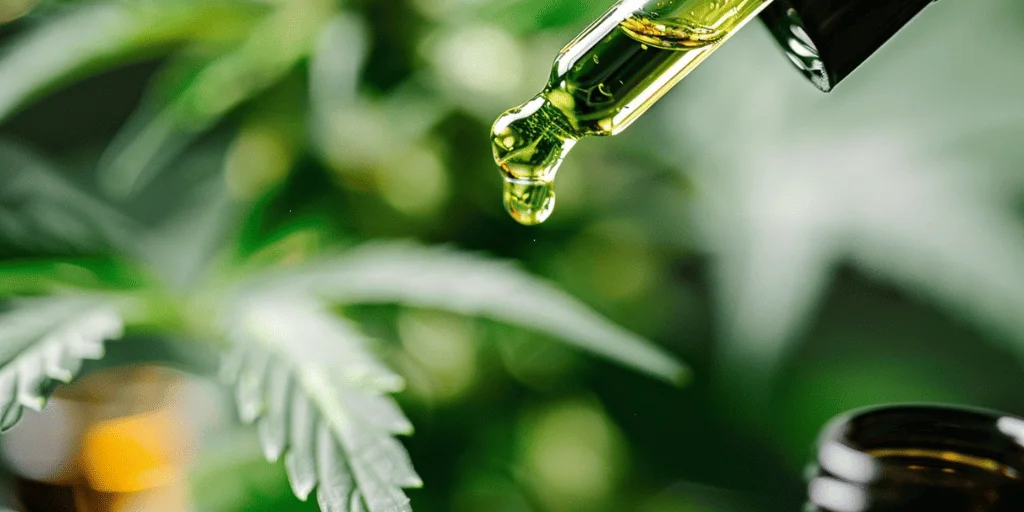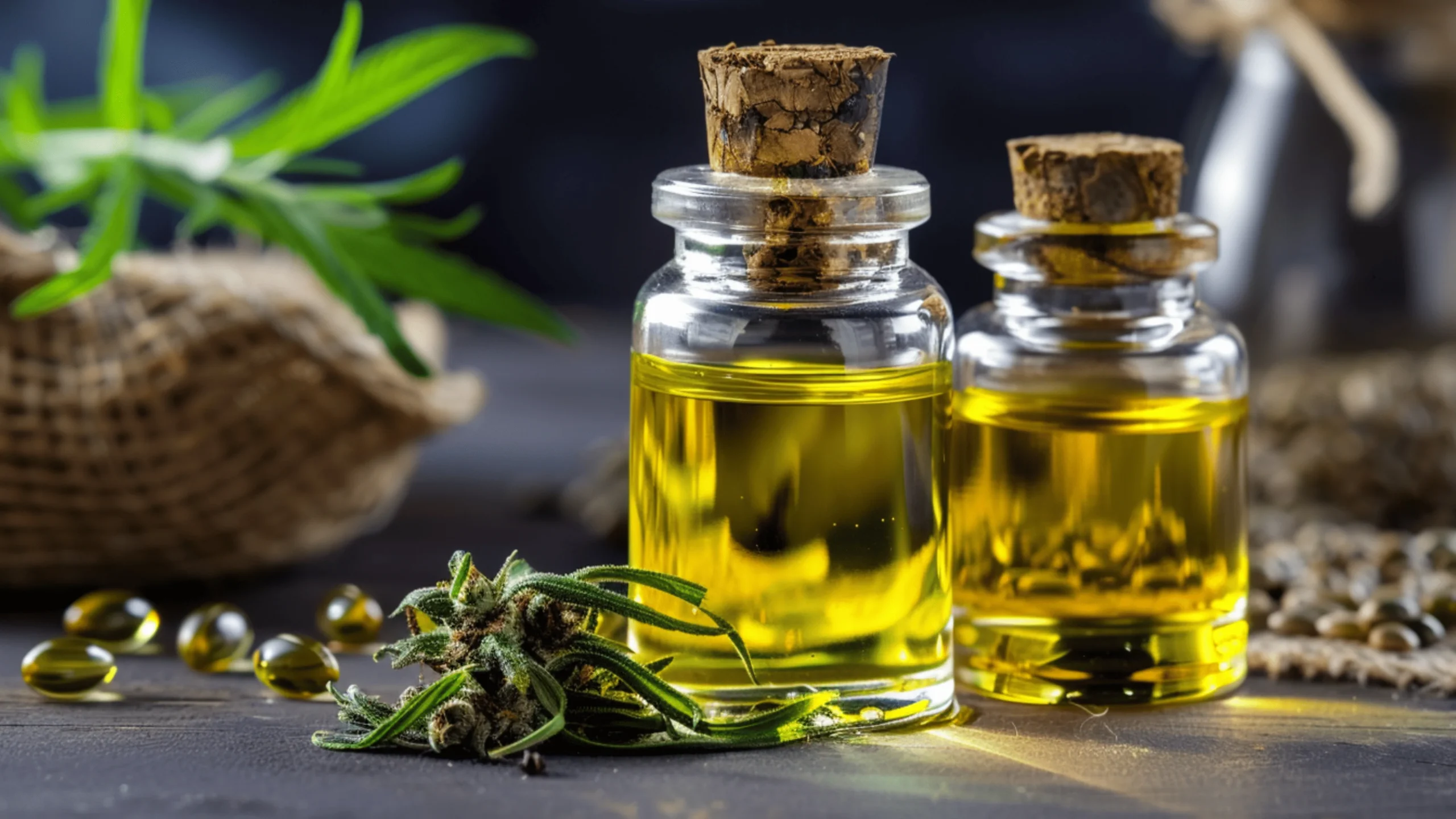If you’re currently thinking of expanding into the CBD market, it’s understandable why you may be confused by why almost every CBD product contains CBD carrier oils. As its name suggests, a carrier oil is a plant or nut oil used to dilute and “carry” a compound, for example, CBD, into the skin or bloodstream. The most popular CBD carrier oils include MCT (coconut) oil which is considered the most effective, hemp seed oil, olive oil, avocado oil and grapeseed oil. CBD Carrier oils improve the absorption of CBD in the body by dissolving the CBD and allowing it to be more easily processed and absorbed by the digestive system.
CBD carrier oils are an important component of CBD products because they help dissolve cannabinoid molecules, allowing the human’s body to better feel the benefits of CBD and other ingredients. The choice of CBD carrier oils influences the final CBD product, from its CBD absorption levels to its thickness, flavors, and secondary benefits. They also impact the level of CBD absorption. Unfortunately, it is worth mentioning that some common CBD carrier oils are derived from plants that can cause allergic reactions for some individuals.
In this article, we’ll highlight frequently used CBD carrier oils in CBD manufacturing and the pros and cons of each.
What is CBD carrier oil?
CBD carrier oils help create stable and easy-to-use CBD products with some additional health benefits. For example, products like CBD isolate or CBD distillate have a very high concentration of CBD and are unfit for direct consumption. Even if they are extracted using the most innovative CO2 extraction method, it will still result in a high concentration CBD product with poor bioavailability.
Since CBD is naturally soluble in oils, it is a common practice to dissolve it in some oil to create an end product. These oils in which CBD oil, CBD isolate, or CBD distillate are dissolved are called CBD carrier oils. Choosing the right CBD carrier oils can significantly impact the product’s effectiveness, ensuring it is both user-friendly and beneficial for health.
Why does CBD need a carrier oil?
It is worth understanding that CBD distillate or other CBD extracts like broad-spectrum CBD oil is also rich in terpenes and polyphenols. Many of these natural compounds are highly unstable, and they tend to degrade quickly, whereas using CBD carrier oils enhances their stability.
Additionally, CBD carrier oils also help to boost the bioavailability of CBD products. Most often, in those countries where this method of use is accepted, people would take CBD oil sublingually, and part of CBD would be quickly absorbed. However, another part enters the bowel, where CBD carrier oils may help protect CBD from the harsh effects of gastric juices.
By using CBD carrier oils like MCT (coconut) oil, the benefits of CBD can be maximized, ensuring that the active compounds are more effectively delivered into the bloodstream. This combination of stability and enhanced absorption highlights the importance of selecting high-quality CBD carrier oils to create effective and reliable CBD products.
Benefits of CBD carrier oils
Various carrier oils can be incorporated into CBD products, either individually or in blends, to achieve several essential functions. Let’s discuss them all.

Better absorption
One key reason for using a carrier oil is that it improves bioavailability, which means it helps a person’s body absorb CBD oil more effectively. CBD is fat-soluble, meaning it dissolves in oil rather than water. Fat-soluble substances are better absorbed when digested along with fat, even in small amounts. When people digest water-soluble substances, like sugar or many vitamins and minerals, their digestive tract sends them directly into their bloodstream because blood is a water-based liquid. In contrast, fat-soluble substances cannot be absorbed this way. Instead, a digestive tract sends them into fatty tissues, where they are distributed through a person’s body by the lymphatic system, which is part of the immune system.
All CBD carrier oils are fat-soluble, which means CBD dissolves in them. Then the oil carries the CBD into the proper tissues, making it more accessible for one’s body. Using CBD carrier oils like MCT oil can therefore significantly enhance the benefits of CBD by ensuring it is effectively absorbed.
Ensures easier dosing
Adding a carrier oil to CBD oil ensures easier dosing because it dilutes the highly concentrated CBD, making it simpler to measure accurate and consistent doses. CBD in its pure form, such as crystalline isolate, requires precise measurements in milligrams, which can be challenging. By incorporating carrier oils like MCT oil, the CBD is evenly distributed throughout the liquid, allowing users to easily administer the desired amount using a dropper. This not only simplifies the dosing process but also enhances the bioavailability and effectiveness of the CBD, ensuring users receive the full benefits with each dose.
The unique mechanism of action
Fats are absorbed and metabolized quite differently by the body compared to water-soluble nutrients. After digestion, fats are taken up by the lymphatic system, whereas water-soluble ingredients go directly to the liver. By bypassing the liver and utilizing lymphatic tissues, fat-soluble substances like those found in CBD carrier oils may offer unique health benefits.
For instance, most lymph is rich in immune cells, suggesting that fat-soluble agents can have more significant immune-modulating effects. When CBD is dissolved in carrier oils like MCT oil, it is absorbed through the lymphatic system, potentially enhancing its benefits. This method of absorption not only improves bioavailability but also supports the immune system more effectively, showcasing the added benefits of using high-quality CBD carrier oils in CBD products.
Helps create unique CBD products
These days, it is common practice to create CBD products adapted for specific needs. This can be achieved by adding various terpenes from other plants like tea trees, Spanish sage, and citrus fruits or other natural ingredients like we do at Hempo Solutions.
CBD carrier oils play an important role in creating these value-added CBD products because they provide a medium in which both CBD and terpenes dissolve effectively. Apart from terpenes, we also sometimes add essential oils like eucalyptus oil and lavender oil to our CBD products. While essential oils cannot be consumed directly due to their potential to irritate mucus membranes, using CBD carrier oils like MCT oil helps to create effective and safe CBD products.

The most popular CBD carrier oils
Now, let’s discuss the most popular CBD carrier oils. As you will see, different types offer various benefits. It’s important to know that all CBD products on the market must indicate which carrier oil they use, so understanding the different forms is crucial.
MCT (coconut) oil
MCT oil is considered the most popular carrier oil for CBD products, primarily derived from coconut or palm kernel oil, with coconut being the most prevalent source. Often listed as fractionated coconut oil on labels, MCT oil is distinguished by its higher liquid content compared to regular coconut oil, thanks to its fatty acids.
Medium-chain triglycerides (MCTs) are a type of fatty acid that the body can quickly absorb without the need for extensive digestion, allowing them to be immediately delivered to the lymphatic system. This property also makes MCT oil easily absorbable through the skin, enhancing its effectiveness in topical CBD products like CBD cosmetics. Long-chain triglycerides require more digestion time, and short-chain triglycerides are often metabolized by gut bacteria before absorption. Thus, MCTs provide an optimal balance, making them highly useful as CBD carrier oils for CBD manufacturers.
Pros and cons of MCT (coconut) oil
| Pros | Cons |
| – Quick absorption due to molecular structure; – 90% saturated fat, which also aids absorption; – Light, thin oil; – Almost flavorless; – Doesn’t require chemical processing; – Less expensive than other CBD carrier carrier oils; – Slow to break down. | – Temporary digestive side effects (nausea, gas, diarrhea, vomiting) in some people; – Possible excessive build-up of ketones in the body; – Not recommended for people with liver disease; – May interact with cholesterol-lowering statin drugs. |
Hemp seed oil
While both come from the same plant, hemp seed oil (sometimes called hemp oil) and CBD oil are not identical. CBD is extracted from the flower, whereas hemp seed oil is derived from the seeds, which contain fewer cannabinoids and terpenes. However, the seeds do have some unique phytochemicals not found in the CBD flowers.
Using hemp seed oil as a CBD carrier oil can contribute to the entourage effect, where the combined components of the plant enhance each other’s effectiveness. This makes hemp seed oil a popular choice for full-spectrum CBD oil that includes all the beneficial compounds of the hemp plant, not just CBD.
Pros and cons of hemp seed oil
| Pros | Cons |
| – Rich in omega-3 fatty acids; – Ideal balance of omega-3 to omega-6 fatty acids; – High in antioxidants; Excellent source of fiber; – Contains minerals like magnesium, calcium, iron, and zinc; – Potential for the entourage effect. | – Lower ability to dissolve CBD compared to MCT oil; – More expensive than MCT oil; – Distinctive flavor (often described as “sharp” or “herby”); – Possible side effects which include diarrhea, nausea, throat irritation, slow heart rate, and high blood pressure. |
Olive oil
Olive oil is known for its health benefits, being rich in iron, vitamin K, vitamin E, and antioxidants. Despite its nutritional value and extensive research backing its health benefits, olive oil is not ideal as a CBD carrier oil. Its thick consistency and strong flavor make it less appealing for CBD products. Moreover, olive oil has lower solvency compared to other carrier oils, meaning it cannot hold as much CBD. Therefore, it is often better reserved for culinary uses rather than CBD formulations.
Pros and cons of olive oil
| Pros | Cons |
| – Rich in iron, vitamin K, and vitamin E; – High in antioxidants; – Highly trusted and well-researched; – Absorbs through the skin faster than MCT oil. | – Its long-chain triglycerides are slower to absorb than MCT oil (but may ultimately absorb more efficiently); – Lower solvency than MCT oil, so it holds less CBD; – Thicker consistency than most CBD carrier oils; – Strong flavor that might not be pleasant. |
Avocado oil
Avocado oil, easily absorbed by both the skin and digestive tract, is a versatile carrier oil for CBD products, particularly topicals and ingestibles. Rich in vitamins A, B, D, and E, avocado oil provides numerous health benefits, though it is among the pricier options. Its thick consistency may not appeal to everyone, and there is a higher risk of allergies compared to other carrier oils. Despite these drawbacks, avocado oil’s nutrient profile makes it an overall good choice for enhancing the health benefits of CBD.
Pros and cons of avocado oil
| Pros | Cons |
| – Quickly and easily absorbed by skin and digestive tract; – Nutty flavor may be more pleasant than some alternatives; – Especially good for topical uses; – Rich in antioxidants; – High in vitamins A, B, D, and E. | – Much thicker than most CBD carrier oils, which may be unpleasant; – Significantly more expensive than many CBD carrier oils; – Higher allergy risk compared to many other CBD carrier oils. |
Grape seed oil
Grape seed oil, known for its light consistency, is commonly used in CBD-infused skin products. It is high in vitamin E and antioxidants, offering natural health benefits. However, grape seed oil is not the best carrier oil for CBD due to its lack of saturated fat, which negatively impacts its bioavailability. Consequently, the body does not absorb as much CBD when using grape seed oil compared to other CBD carrier oils. It is best suited for topical CBD applications or as a secondary ingredient alongside a primary carrier oil.
Pros of and cons of grape seed oil
| Pros | Cons |
| – Rich in vitamin E and antioxidants; – Light in weight and quickly absorbed by the skin; – Has a neutral taste. | – Less commonly available compared to other carrier oils; – Not suitable for individuals with grape allergies; – Absorbs more slowly. |
Why do we recommend using MCT (coconut oil)?
At Hempo Solutions, we use a variety of CBD carrier oils, including those we have already discussed. However, we believe that MCT oil is the best choice, especially when sourced from coconut oil. MCT oil stands out as the optimal carrier for CBD oil due to its exceptional ability to enhance bioavailability. This means that MCT oil helps the body absorb CBD more efficiently, making the CBD more effective. Its properties make it superior to other oils in ensuring that users receive the full benefits of their CBD products. Here’s an in-depth look at why MCT oil is an ideal choice for maximizing the efficacy of CBD and why we recommend using it:
Optimized bioavailability
The medium-chain triglycerides (MCTs) in MCT oil are uniquely absorbed directly into the bloodstream through the liver, bypassing the longer metabolic route that other fats undergo. This easy absorption process makes MCT oil an exceptional carrier for CBD.
Enhanced bioavailability, a key benefit of MCT oil, means that more CBD is available for the body to absorb, thereby enhancing its potential therapeutic effects. This efficient delivery system ensures that the maximum amount of CBD reaches the bloodstream, improving the overall efficacy of CBD products and allowing users to experience the full range of CBD’s benefits.
Efficient delivery system
MCT oil’s molecular structure allows for a more efficient delivery system for CBD. By covering CBD molecules, MCT oil ensures a higher rate of absorption, making the CBD more readily available to the body. This enhanced absorption process means that the therapeutic benefits of CBD are maximized, as the body can utilize more of the compound effectively.

Boosting overall efficacy of CBD products
The increased bioavailability offered by MCT oil ensures that CBD’s benefits are maximized. This is particularly important for those using CBD for specific purposes, as it means lower doses of CBD may be needed to achieve the desired effect. By enhancing the absorption rate, MCT oil allows the body to utilize CBD more efficiently, which can lead to more effective therapeutic outcomes.
Maintaining stability and longevity
Additionally, MCT oil’s stability and long shelf life further enhance its suitability as a carrier oil for CBD. This stability ensures that the therapeutic properties of CBD are preserved over time, providing consistent and reliable results for users. The combination of increased bioavailability and product stability makes MCT oil an ideal choice.
Summary
Carrier oils are crucial to CBD because they help dissolve the cannabinoid’s molecules, allowing them to be absorbed by the body. Many carrier oils are similar, but they may have differences that could be important for various health reasons.
One key reason for any manufacturer using a carrier oil is that it improves bioavailability, meaning it helps the body absorb CBD oil more effectively. Additionally, using a carrier oil makes it easier to deliver accurate and consistent doses, as it’s simpler to measure out a dropperful of CBD-infused oil than a tiny amount of crystalline isolate, which is CBD in its pure form.
Beyond facilitating CBD absorption, CBD carrier oils may also offer their own health benefits. Five common CBD carrier oils that we’ve covered in this article not only enhance the effectiveness of CBD but also contribute their unique properties to the overall health benefits of the final product.
Featured Articles

Blog Home
No Content



